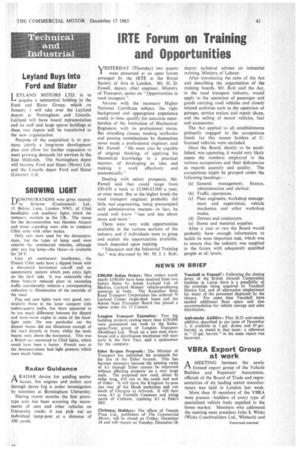IRTE Forum on Training and Opportunities
Page 43

If you've noticed an error in this article please click here to report it so we can fix it.
\JESTERDAY (Thursday) two papers were presented at an open forum arranged by the IRTE at the Royal Society of Arts in London. Mr. H. D. Fawell, deputy chief engineer, Ministry of Transport, spoke on "Opportunities in road transport ".
Anyone with the' necessary Higher National Certificate subject, the right background and appropriate experience could, in time, qualify for associate membership of the Institution of Mechanical Engineers, with its professional status. But attending classes, reading textbooks and passing examinations by themselves never made a professional engineer, said Mr. Fawell. "He must also be capable of original thinking, of applying his theoretical knowledge in a practical manner, of developing an idea and making it work effectively and economically." • Dealing with salary prospects, Mr. Fawell said they could range from £20-£30 a week to 2,000-£3,000 a year, or even more. But at the higher levels the road transport engineer probably did little real engineering, being preoccupied with administrative matters—in fact, he could well know " less and less about more and more ".
There were very wide opportunities available in the various sections of the industry and if individuals were to grasp and exploit the 6pportunities available, much depended upon training. "Education and the Industrial Training Act" was discussed by Mr. M. J. J. Rolt, deputy technical adviser on industrial , training, Ministry of Labour.
After introducing the aims of the Act and describing the organization of the training boards, Mr. Rolt said the Act, in the road transport industry, would apply to the operation of passenger and goods carrying road vehicles and closely related activities such as the operation of garages, service station and repair shops, and the selling of motor vehicles, fuel and accessories.
The Act applied to all establishments primarily engaged in the occupations listed; for this reason holders of Clicensed vehicles were excluded.
Once the Board, shortly to be established, was operating, it would very likely assess the numbers employed in the various occupations and their deficiencies as regards quantity and quality. The occupations might be grouped under the following headings:— (a) General management, finance, administration and clerical.
(b) Traffic operations.
(c) Fleet engineers, workshop management and supervision, vehicle mechanics and other workshop trades.
(d) Drivers and conductors.
(e) Stores and material supplies.
After a year or two the Board would probably have enough information to tackle its most important task, which was to ensure that the industry was supplied in the future with adequately qualified people at all levels.












































































































